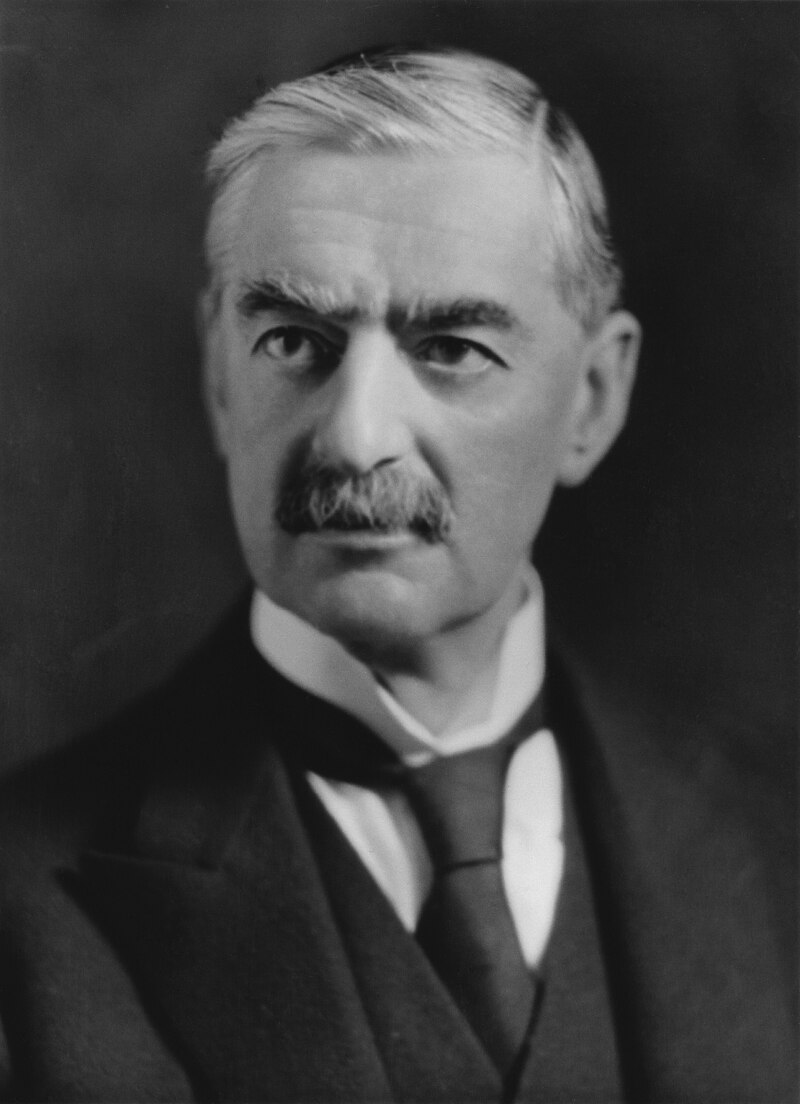
Neville Chamberlain
Neville Chamberlain was a British statesman who served as Prime Minister from 1937 to 1940. He is best known for his policy of appeasement towards Adolf Hitler, notably exemplified by the Munich Agreement in 1938, which allowed Nazi Germany to annex parts of Czechoslovakia in hopes of avoiding war. This policy ultimately failed, as World War II broke out shortly after. Chamberlain's legacy is often criticized for his inability to confront the growing threats posed by fascism in Europe.
Born on Mar 18, 1869 (156 years old)
Global Media Ratings
Countries Mentioned
| Country | Mentions | Sentiment | Dominance | + Persistence | x Population | = Reach | x GDP (millions) | = Power |
|---|---|---|---|---|---|---|---|---|
| Denmark | 1 | 5.00 | 0.10% | +0% | 5,792,202 | 5,596 | $350,000 | 338$ |
| Australia | 1 | 4.00 | 0.09% | +0% | 25,499,884 | 24,056 | $1,380,000 | 1,302$ |
| Jamaica | 1 | 3.00 | 0.11% | +0% | 2,961,167 | 3,174 | $15,000 | 16$ |
| Totals | 3 | 34,253,253 | 32,826 | $1,745,000 | 1,656$ |
Interactive World Map
Each country's color is based on "Mentions" from the table above.
Recent Mentions
 Jamaica:
Neville Chamberlain is referenced as an imbecile fooled by Hitler's diplomacy.
3
Jamaica:
Neville Chamberlain is referenced as an imbecile fooled by Hitler's diplomacy.
3
 Australia:
Prime Minister Neville Chamberlain is referenced in the context of appeasement during the 1930s.
4
Australia:
Prime Minister Neville Chamberlain is referenced in the context of appeasement during the 1930s.
4
 Denmark:
Lars Løkke Rasmussen compared himself to Neville Chamberlain in the context of political discussions.
5
Denmark:
Lars Løkke Rasmussen compared himself to Neville Chamberlain in the context of political discussions.
5
 Luxembourg:
Neville Chamberlain was the British Prime Minister known for his policy of appeasement towards Hitler.
5
Luxembourg:
Neville Chamberlain was the British Prime Minister known for his policy of appeasement towards Hitler.
5
 Romania:
Neville Chamberlain was the British Prime Minister who agreed to the Munich Agreement in 1938.
5
Romania:
Neville Chamberlain was the British Prime Minister who agreed to the Munich Agreement in 1938.
5
 Ukraine:
Neville Chamberlain was the British Prime Minister who made the Munich Agreement with Adolf Hitler in 1938.
4
Ukraine:
Neville Chamberlain was the British Prime Minister who made the Munich Agreement with Adolf Hitler in 1938.
4
 Belarus:
Chamberlain was mentioned as one of the prime ministers who signed the Munich Agreement with Hitler.
5
Belarus:
Chamberlain was mentioned as one of the prime ministers who signed the Munich Agreement with Hitler.
5
 Ireland:
Neville Chamberlain is referenced as the British prime minister who failed to defend Czechoslovakia against Hitler's demands.
4
Ireland:
Neville Chamberlain is referenced as the British prime minister who failed to defend Czechoslovakia against Hitler's demands.
4
 Switzerland:
Neville Chamberlain is referenced in the context of historical attempts to appease aggressors.
5
Switzerland:
Neville Chamberlain is referenced in the context of historical attempts to appease aggressors.
5
 Montenegro:
Neville Chamberlain is mentioned in the context of his failed appeasement policy towards Hitler.
4
Montenegro:
Neville Chamberlain is mentioned in the context of his failed appeasement policy towards Hitler.
4
